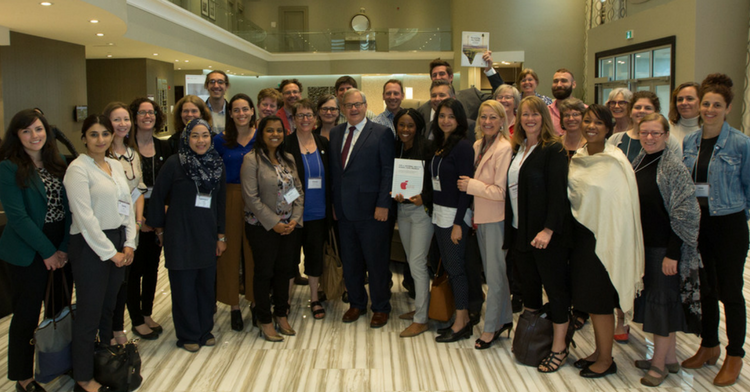by Alexandra Zannis, CFICE Communications Volunteer
 Since its inception in 2001, Food Secure Canada (FSC) has been a strong voice for food security and sovereignty advancements in Canada. Through partnerships with projects like Community First: Impacts of Community Engagement (CFICE), FSC has brought their advocacy game to new heights.
Since its inception in 2001, Food Secure Canada (FSC) has been a strong voice for food security and sovereignty advancements in Canada. Through partnerships with projects like Community First: Impacts of Community Engagement (CFICE), FSC has brought their advocacy game to new heights.
In contrast with other community-based organizations that often lack capacity to conduct independent research, FSC has capitalized on partnering with organizations rooted in both academia and the community to conduct and produce unique, targeted research. The organization’s community-campus engagement (CCE) work has led to many pivotal wins including grants to conduct research on Northern Sustainable Food Systems and Food Costing in Northern Communities. This recognition of FSC as a research-capable organization exhibits an important shift in Canadian culture towards valuing local research expertise and its contribution towards informing all levels of government during policy development.
So, who is FSC and what do they do?
 Food Secure Canada (FSC) is a national network of organizations and individuals working together to bring food and farming issues to the forefront of Canadian policy. Throughout its existence, FSC has championed dialogue domestically and internationally regarding its three main goals: zero hunger, healthy and safe food, and sustainable food systems for all.
Food Secure Canada (FSC) is a national network of organizations and individuals working together to bring food and farming issues to the forefront of Canadian policy. Throughout its existence, FSC has championed dialogue domestically and internationally regarding its three main goals: zero hunger, healthy and safe food, and sustainable food systems for all.
As a multi-faceted organization, FSC expedites conversation and action for a more equitable and community-driven food movement. Key components of FSC’s foci of action include: increasing access to food research and knowledge, supporting the development of food research and food-related projects, advocating for food policies at the federal level, and most notably, ensuring all Canadians are given a platform to engage with what a national food policy would do for the millions it intends to serve.
What is FSC’s relationship with CFICE?
In 2012, FSC partnered with CFICE to create the Community Academic Collaborative — a network of academics, non-profits and community organizers dedicated to strengthening partnerships between community and academic sectors. The Collaborative helps to increase the quantity and quality of sharp, progressive research that directly impacts the evolution of a more equitable and just food system.
Amanda Wilson, Assistant Professor in the School of Social Innovation at Saint Paul University and former Post-Doctoral research fellow at FSC, says this collaborative effort between stakeholders isn’t a new phenomenon within food system work in Canada. “There has always been a close and collective relationship between academia and community work, both of which are supportive of each other within the food movement and between agri-food scholars,” Wilson says. While community-campus collaborations have been part of food security work for a while, the Collaborative represents a formal network dedicated to sharing knowledge. Within this knowledge base, FSC and Collaborative members can facilitate relationships between community and campus researchers and collaboratively create and mobilize food research for more informed policy.
Through the Collaborative, FSC has effectively bridged the relationship between front line service work and research faculties. This merger provides various food organizations with a wealth of knowledge, undoubtedly contributing to their advocacy and program facilitation across the country. In addition, the research produced is indispensable since it is driven and informed by community needs and expertise.
How does the Collaborative, and FSC’s relationship with CFICE, strengthen their advocacy work?
FSC’s partnership with CFICE through the Community Academic Collaborative, has supported FSC in claiming their rightful seat at the table when working with government officials. By bolstering its policy recommendations with comprehensive evidence-based reports, FSC is creating a Canada to be proud of in regards to accessing safe and nutritious food for all.
According to Wilson, FSC’s work has a direct impact on communities across the country: “The partnerships between the community and academic institutions builds a more collective and effective community. It gives [FSC] the chance to engage in research that we wouldn’t normally call research, like town halls or focus groups. We then use this research to create greater engagement for policy change, facilitate conferences and build the complex web of relationships and projects that hopefully moves towards building a better food system for everyone.”
Undeniably, the Collaborative has led to big wins for FSC and the rest of the food community in Canada.
For example, the Collaborative has given FSC the support it needs to continue to fight for a National Food Policy for Canada. This work is important; Despite Canada’s commitments to the Universal Declaration of Human Rights and the International Covenant on Economic, Social and Cultural Rights, FSC estimates that at least 4 million people in Canada still live without secure access to food.
The capacity FSC has gained through the Collaborative has given them the ability to produce policy reports, conduct presentations and events, host conferences, and organize webinars to present their research to those who can create change in Canada. FSC’s collaborative CCE efforts were recently rewarded as the release of the Standing Committee on Agriculture and Agri-food’s report, A Food Policy for Canada, thoroughly encompassed several of FSC’s key recommendations including recognizing food as a human right, and the importance of implementing a Food Policy Advisory Body.
FSC’s efforts have even led to recognition by international food organizations also working on national food policy initiatives, as well as another government research contract further increasing its recognition and legitimacy as a leader in food policy work.

Food Secure Canada presents with CFICE as part of a panel on Food Policy Council models at the Common Food Policy Conference in Brussels.
The need for capacity to create opportunity
Community-based organizations like FSC evolving to become leaders in advocacy and research is a feat worthy of recognition. As Wilson notes, many organizations face a continuous struggle to nurture their advocacy and research work in the absence of support from strong community-campus partnerships. “In some ways it’s like a chicken and the egg debate. You need a strong baseline of capacity that allows you to go out and look for contracts and grants to begin with. Once you have that base, you are able to tackle the core concepts of our work, which is making sure the community is in the driver’s seat.”
Through FSC’s ability to capitalize on the support gained through community-campus partnerships like the one with CFICE, FSC has been able to produce research that brings to the table the importance of vibrant food systems. The impact they have had as a result spans from improved access to food in the North, increased environmental stewardship and more widespread sustainable production and harvesting practices, to improved health and safety, and more innovative food initiatives and governance.
As we patiently wait for a Canada with zero hunger, our job has to be supporting organizations and partnerships that fight for a safer, more equitable country for all.


